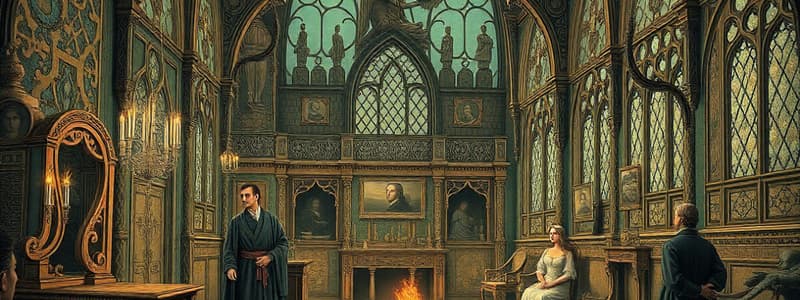Podcast
Questions and Answers
What significant event occurred a year before Macbeth was written?
What significant event occurred a year before Macbeth was written?
- The Gunpowder Plot (correct)
- The death of Queen Elizabeth I
- The start of the Renaissance
- The rise of James I
Macbeth is primarily concerned with themes of loyalty and friendship.
Macbeth is primarily concerned with themes of loyalty and friendship.
False (B)
Name one of the classical narrative stages that Macbeth follows.
Name one of the classical narrative stages that Macbeth follows.
parapattaya
Lady Macbeth embodies traditionally __________ traits, challenging gender stereotypes of her time.
Lady Macbeth embodies traditionally __________ traits, challenging gender stereotypes of her time.
Match the following elements of Macbeth with their significance:
Match the following elements of Macbeth with their significance:
In the context of the Great Chain of Being, what was the consequence of Macbeth killing King Duncan?
In the context of the Great Chain of Being, what was the consequence of Macbeth killing King Duncan?
Renaissance humanism emphasizes the belief that individuals have no control over their fate.
Renaissance humanism emphasizes the belief that individuals have no control over their fate.
What is one key theme explored in Macbeth related to leadership?
What is one key theme explored in Macbeth related to leadership?
Flashcards
The Great Chain of Being
The Great Chain of Being
A hierarchical system where everything has a place, from God to the king and the people. Disrupting this order leads to chaos.
Renaissance Humanism in Macbeth
Renaissance Humanism in Macbeth
The play's themes of ambition, fate, and free will.
Classical Influence on Macbeth
Classical Influence on Macbeth
A play that follows the traditional Greek tragic form, showcasing the tragic hero's downfall and leading to catharsis in the audience.
Fate in Macbeth
Fate in Macbeth
Signup and view all the flashcards
Usurpation in Macbeth
Usurpation in Macbeth
Signup and view all the flashcards
Banquo's Prophecy
Banquo's Prophecy
Signup and view all the flashcards
Gender Roles in Macbeth
Gender Roles in Macbeth
Signup and view all the flashcards
The Jacobean Period
The Jacobean Period
Signup and view all the flashcards
Study Notes
Macbeth’s Context
- Macbeth was written in 1606, during the Jacobean Period, after the death of Queen Elizabeth I
- James I, a relative of Elizabeth, became the first King of both England and Scotland
- The Gunpowder Plot, an attempted assassination of James I, occurred a year before the play
- The play explores the theme of usurpation and the consequences of ambition
- The play is seen as an allegory for James I’s rise to power and his legitimacy as ruler
- Banquo, a distant ancestor of James I, is portrayed as honorable, contrasting with Macbeth’s villainous actions
- The witches’ prophecy that Banquo’s descendants will be kings, alludes to James I’s dual rule over England and Scotland
The Great Chain of Being
- The Great Chain of Being was a dominant Renaissance concept that influenced Macbeth
- This belief system emphasizes a divinely ordained hierarchy with God at the top, followed by the king and then the people
- When someone disrupts this hierarchy, as Macbeth does by killing King Duncan, chaos unfolds
- Macbeth’s act triggers turmoil in the natural world and in his own mind.
Renaissance Humanism
- Macbeth was written during a period of transition between medieval religious thought and emerging Renaissance humanism
- The play explores the clash between pre-determined fate and free will
- References to ghosts, witches, and hell are alluding to medieval superstition and the belief that individuals were bound by fate
- However, the play also suggests that Macbeth’s actions are driven by his own ambition, showcasing humanist beliefs in free will
Gender Roles in Macbeth
- Shakespeare’s female characters are shaped by the prevailing gender stereotypes of the Jacobean period
- Women were expected to be passive and virtuous while men were expected to be strong and dominant.
- Lady Macbeth embodies traditionally masculine traits of dominance and cruelty, subverting this expectation
- While Macbeth is portrayed as weak and indecisive, showing a reversal of expected gender roles.
Classical Influence on Macbeth
- The play's form and structure are influenced by classical Greek theater, especially the ideas of Aristotle.
- Macbeth follows the traditional narrative stages of Greek tragedy: parapattaya (turn of fortune), hamartia (fatal flaw) and anagnorisis (realization).
- The play culminates in the tragic hero's downfall, evoking catharsis in the audience.
Studying That Suits You
Use AI to generate personalized quizzes and flashcards to suit your learning preferences.




